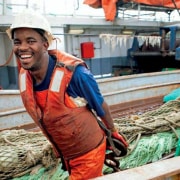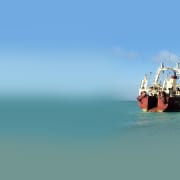|
Getting your Trinity Audio player ready...
|
Image: Ester Mbathera
Have you ever heard of the notion that “Corruption is a victimless crime”?
This is something that corrupt people, and their supporters, would like us to believe. Even our own Jacob Zuma is reported to have said it.
The truth, however, is that the victims of corruption are TNTC – a microbiological term meaning too numerous to count. They are ordinary people, vulnerable people, many of them driven to poverty or kept in poverty because of eroded quality of life, poor service delivery, human rights violations, lack of development, no employment, absence of the rule of law, and other impacts that corruption has on our societies.
Namibia’s Fishrot corruption scandal is an example of the worst effects of corruption on people who must work for a living and support their families and therefore rely on employment being available. It shows up the the profound human cost and ongoing suffering not only of those directly impacted, but also of the family and friends surrounding the victims.
This is again emphasised in the Institute for Public Policy Research’s (IPPR) recently released follow-up to its first report on the human impact of the Fishrot scandal. The first publication, titled We are the Ones that Suffered the Most: The human rights impacts of the Fishrot corruption scandal on Namibian fisheries workers, was released in March 2024. The second, titled RIGHT NOW, I CANNOT SURVIVE: The legacy effects of the Fishrot corruption scandal on fisheries workers’ lives, was released in November 2024.
Both reports were researched and penned by Frederico Links of the IPPR and Ester Mbathera, a Namibian freelance journalist.
“Sometimes white collar crime is seen as almost victimless, as if there are no real victims of corruption,” said IPPR ED Graham Hopwood at the report launch. “But in this case there are actually hundreds and hundreds of victims of the Fishrot corruption scandal.”
Greed and collusion
The Fishrot scandal, which was exposed in 2019 in Namibia’s fishing industry, was a result of the corrupt actions of Icelandic fishing company Samherji and its partners in crime, officials in the Namibian government as high-ranking as Cabinet ministers. Between 2012 and 2018 the fishing company paid millions in bribes to the various officials to secure access to horse mackerel quotas. It then furtively moved its profits out of the country, depriving Namibia of valuable tax revenue.
When the scandal broke and Samherji closed its Namibian operations, hundreds of fisheries workers were suddenly jobless, many of whom are unskilled migrant labourers from rural areas, especially in the north of the country.
The IPPR reports highlight the severe social, economic, and personal consequences which now plague the workers, including unemployment, poverty, broken families, and health issues like hypertension. Affected individuals receive N$4 000 monthly from a government redress program, which is barely enough for just surviving, let alone supporting families.
The organisation has consistently called for Samherji to acknowledge, apologise to, and compensate the victims, which the fishing company seems disinclined to do. Corruption Watch started covering Fishrot in 2020, and in that time we have seen no effort from the perpetrators to help those whose lives they destroyed with hardly any notice or explanation.
“There has been considerable movement on the Namibian front in holding the implicated individuals accountable for their alleged corrupt acts,” says the IPPR, but “on the Icelandic side there has been disturbingly little done to bring the implicated Samherji officials to book for the damage wrought on the lives of Namibian fishermen, the Walvis Bay community, and the far-flung rural communities that relied on fishermen’s salaries.”
The heavy price of corruption
The aim of the second phase study, says the IPPR, was to “establish whether the experiences narrated by former fisheries workers during the first phase study play out across a wider segment of former fisheries workers”.
Some 90 former fisheries workers and a few current fisheries workers were surveyed through a questionnaire and interviewed between April and September 2024.
The findings are as heartbreaking as those of the first report.
Almost 90% of respondents have been unable to secure new employment, and over 80% now rely on family and friends for assistance, where before they were the ones who were able to help. This is an unimaginable affront to personal dignity. Many have fallen into debt and struggle with food insecurity.
“The situation at home is terrible. We survive on the government feeding scheme. My father even sold his livestock to keep the family going,” said the daughter of a former fisheries worker.
However, the government redress programme is not enough to cover costs like food, children’s education, and housing, which were organised or acquired during the good times.
Respondents spoke of many personal battles because of long-term unemployment, including separation from their partners or children when relationships ended under the strain or families had to be sent to stay with relatives, disruptions to extended family relations, loss of friends, feeling that they have lost the respect of their families and communities, and substance abuse to cope with the pain.
Many workers said they were seen as leaders in their villages, providing financial support for local schools, healthcare, and community events. Those with cars used to assist with transport, while others contributed towards infrastructure development in their villages, including the provision of potable water and the construction of shaded areas for pension payouts. Others participated in sports development by funding community soccer teams.
Fishrot has destroyed far more than the lives of the workers.
Hopes and dreams
Most respondents said they enjoyed their work and would like to go back to the sea.
“Life was good. At least I was able to help my immediate family, my extended family. I had a house, a wife and kids, I had a car, but now I lost all those things. I lost everything.”
This statement is true of 13% of respondents, who say they have lost all property and assets they had accumulated when they had been employed.
What the workers want above all else is for Samherji to admit to its wrongdoing and for it and the Namibian government to rectify the damage wrought. They want to throw off the terrible hopelessness and regain their financial independence, their self-worth, and their dignity.
They still hope for justice and restoration. “They want the government to facilitate dialogue with Samherji and the Icelandic government to negotiate compensation that would enable them to regain the assets they lost – such as homes, cars, and savings,” says the IPPR report.
Fishrot background
A decade ago, Samherji’s former operations director Jóhannes Stefánsson quit his job at the Namibian division of the Icelandic fishing company, to expose what is now known as the Fishrot corruption scandal.
Stefánsson, who admits that he was part of the mismanagement until his conscience got the better of him, left the company in 2014 and two years later leaked 30 000 documents to WikiLeaks, who published them as the Fishrot Files. The documents and e-mails provided a treasure trove of information for the Al Jazeera investigators who took the case on, and they broke the story in 2019.
The Fishrot Files revealed how Samherji allegedly secured access to Namibian horse mackerel quotas by dishing out millions of dollars in bribes to Cabinet ministers and businessmen between 2012 and 2018. The company then sent its profits abroad through tax havens and some of its operations in other countries, including Cyprus, the UK, Mauritius, Dubai, Iceland, Norway, Namibia, and Poland. These were the waypoints for the money that eventually ended up in private bank accounts.
The IPPR partnered with Transparency International Iceland in 2021 to work on the matter and more effectively challenge the status quo – but justice has been long in coming.
While arrests were made in Namibia, including those of several high-profile politicians, the Fishrot corruption trial has yet to get fully under way because of various delays and numerous bail applications – none of which have been granted. The latest news is that the Namibian High Court has dismissed an application to split the trial so that the accused will be tried separately.







